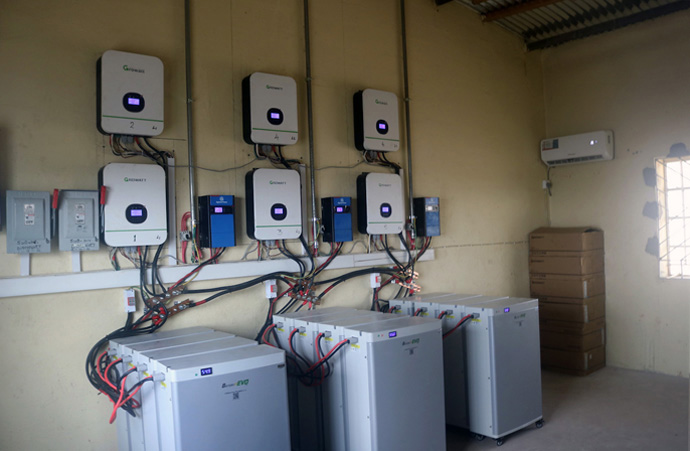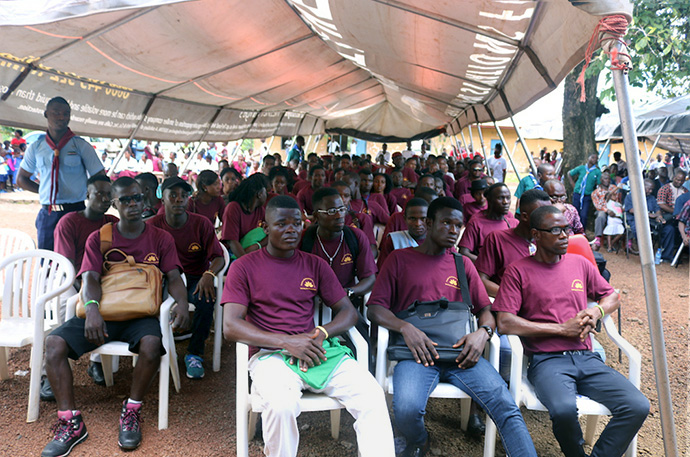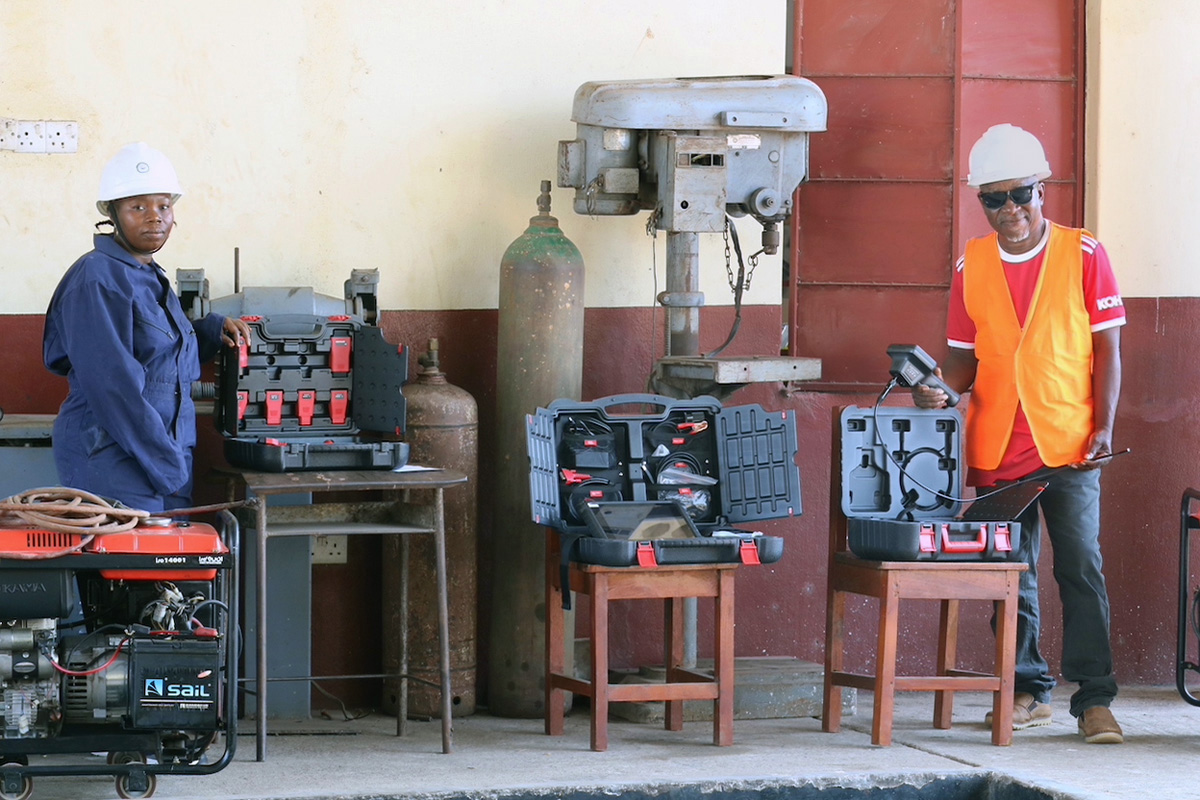Key Points:
- The Sierra Leone Conference’s first hybrid vocational and entrepreneurship school envisions new opportunities for students and staff with the addition of 24/7 solar-powered electricity.
- The solar power grid was funded by Operation Classroom, a United Methodist organization supported by churches in the Indiana Conference.
- The school opened with 60 students. Admissions dropped during the COVID-19 years, but 100 students are now enrolled.
Solar electricity at the Sierra Leone Conference’s first hybrid vocational and entrepreneurship school will unlock new opportunities for students and tutors alike, church leaders say.
Opened four years ago, Taiama Enterprise Academy struggled to roll out some programs because it lacked a reliable power source to provide upscale training in engineering, science, motor mechanics and agriculture.
The facility now has 24/7 solar-powered electricity, thanks to funding from Operation Classroom, a United Methodist organization supported by U.S. churches in the Indiana Conference. The nonprofit works with The United Methodist Church in Sierra Leone and Liberia to improve education in the West African countries.
“To date, Operation Classroom has invested nearly $90,000 at the Taiama Enterprise Academy,” said Robert Coolman, Operation Classroom president. “That does not include the countless hours of donated time involved in putting this project together.”
He said the hope is that the solar power will enhance classroom instruction and after-hours study, including the use of a new computer laboratory that should be in operation before the end of the school year.
Installation is 95% complete, and the campus is already experiencing limited, but increasing, hours of electricity per day.

A few hitches remain in order to harness the full potential of the 96-solar-paneled grid, according to Josie Koker, who traveled from Indiana to install the facility at Taiama Enterprise Academy.
The school opened with 60 students. Admissions dropped during the COVID-19 years, but 100 students are now enrolled. That number is expected to rise, said academy director Duramani Massavoi.
“Our facilities and equipment for training are expanding. Students will now access online services in a congenial learning environment. Both students and teachers will be doing research using the internet we have on campus. Previously, we could use the internet sparingly because of insufficient supply of electricity.
“Solar will positively affect the study habits of our students,” he added. “We used to switch on the generator at 7 p.m. and switch off at 10 p.m. Students will have electricity throughout night and day. So, they’ll study more at night.”
Running the generators was expensive, especially when global fuel prices skyrocketed. The money saved can now be used for instructional materials, employee salaries and implementation of new programs, Coolman said.
The school also now has special facilities and equipment, including an industrial grade walk-behind tractor and implements, a “saw shed” for milling lumber in the building trades department, sophisticated engine-diagnostic equipment in the engine mechanics department, a piggery in the agriculture department, and a 2023 Toyota 70 Land Cruiser to use for a variety of purposes.

Massavoi said his work as director will be easier and more comfortable with the solar power.
“Before solar, our offices were really hot when temperatures were in the 90s to 100s. Now, we’ll install cooling systems that will keep us at work, even when the atmospheric temperature is high. Previously, we would put our printing tasks on hold until night when we switched on the generator.”
Lansana Sandy, building trades tutor, believes the electricity will improve his efficiency.
“The workload and the time given to me in the day is very small,” he said. “With electricity on campus for 24 hours, I can sometimes schedule evening classes.”
Raymond Kabbah, engineering tutor, said the lack of electricity adversely affected training programs.
“Before now, most of our computers were not regularly charged. We relied mainly on diesel-powered generators that would only come on for three hours a day owing to the high cost of fuel.”
Nightly blackouts in the compound also caused security concerns.
“In my workshop, we now have expensive equipment, including new diagnostic machines,” Kabbah continued. “With the big boost of 24-hour electricity, there will surely be an astronomic leap in everything we do. It will enhance effective teaching.”
Subscribe to our
e-newsletter
Online research will improve because of better Wi-Fi for computers and projectors.
Matilda Vandy, a kitchen staffer at the academy, anticipates healthier and better food.
“Continuous electricity will help us plan better and economize resources. It reduces our work time, and we can preserve food longer than previously,” she said. “In the restaurant, students and staff can now eat under good conditions. We can switch on the fans on hot days, and they can eat in a cool and relaxed atmosphere.”
John J. Sam, the agriculture department head, said he is overjoyed by the electricity transformation.
“We use submersible pumps to supply water to the farms and piggery, but intermittent supply of electricity limited how much we could do in the farms. Water supply was being rationed. Sometimes, our tanks were supplied weekly. Now, with regular supply of electricity, we will have a continuous supply of water in the farms.
“This will surely lead to expansion of our activities and even an increase in the quantity of vegetables we produce and sell on the local market.”
Agriculture student Daniel Armoh once was afraid of walking on campus in the dark, he said.
“Now, our compound is bright at night. The electricity has also improved our study hours. Now I can wake up at any time of the night and study.”
Engineering student Aminata Tarawally said learning before the introduction of solar-powered electricity was difficult. When the lights were switched on for three hours in the evening, her dormitory was very noisy.
“I am not used to studying in a noisy environment,” she said, adding that she used to buy batteries to charge a torchlight to study. “For a student, that is costly, and sometimes, I do not have the money to buy batteries.
“With regular electricity now, there’s going to be a big relief.”
Phileas Jusu is a communicator for the Sierra Leone Conference.
News media contact: Julie Dwyer at newsdesk@umnews.org. To read more United Methodist news, subscribe to the free Daily and Friday Digest.



